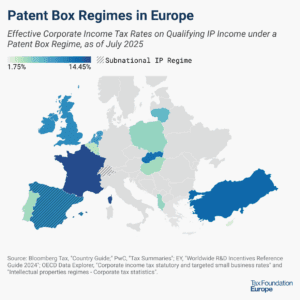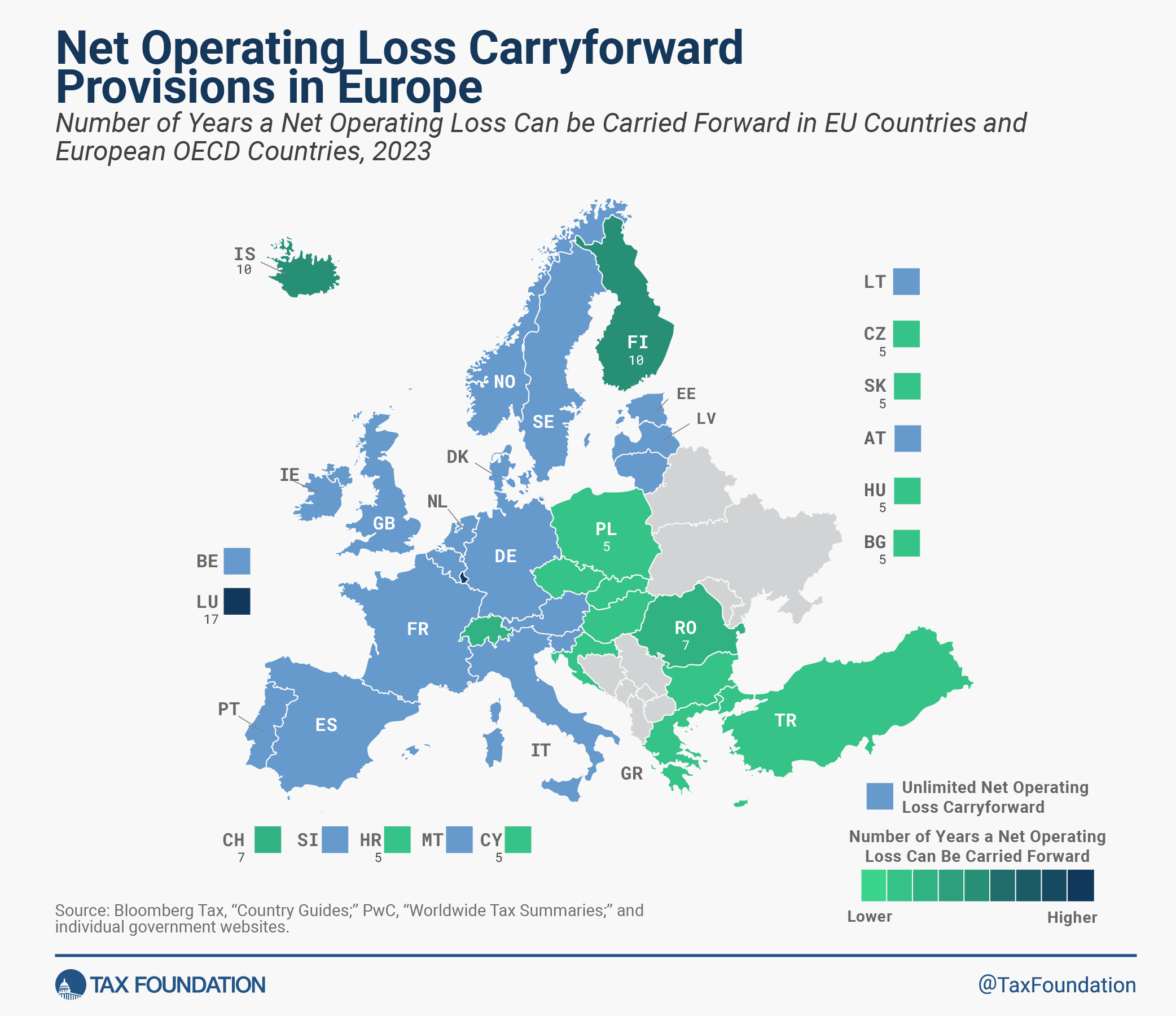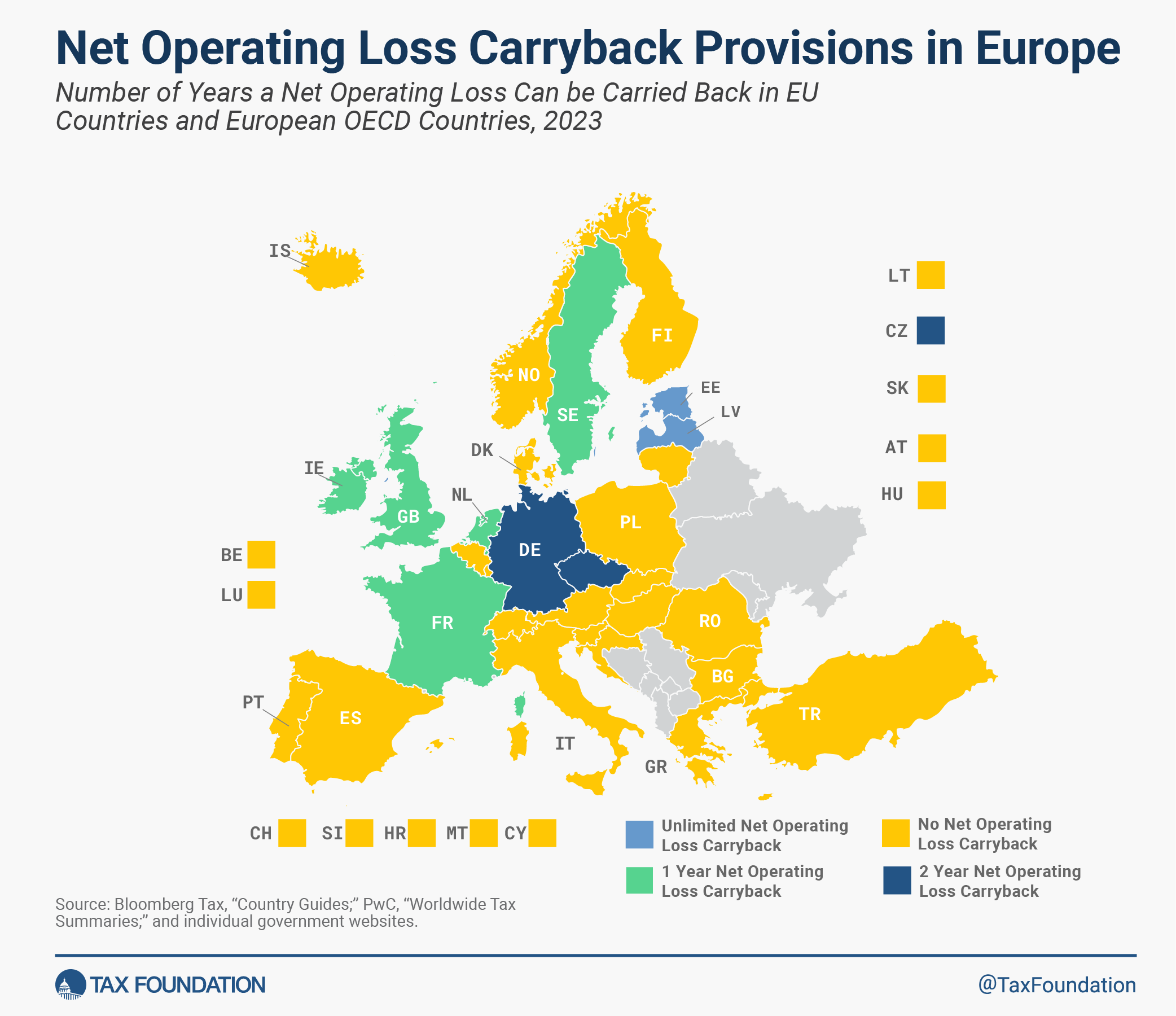
Net Operating Loss Carryforward and Carryback Provisions in Europe, 2023
3 min readBy:Loss carryover provisions allow businesses to either deduct current year losses against future profits (carryforwards) or current year losses against past profits (carrybacks). Many companies have investment projects with different risk profiles and operate in industries that fluctuate greatly with the business cycle. Carryover provisions help businesses “smooth” their risk and income, making the tax code more neutral across investments and over time.
Ideally, a taxA tax is a mandatory payment or charge collected by local, state, and national governments from individuals or businesses to cover the costs of general government services, goods, and activities. code allows businesses to carry over their losses for an unlimited number of years, ensuring that a business is taxed on its average profitability over time. While some countries do allow for indefinite loss carryovers, others have time limits. The following two maps look at this time restriction on loss carryovers, showing the number of years a business is allowed to carry forward and to carry back net operating losses (NOLs).
Eighteen out of the 32 European countries analyzed (EU and European OECD countries) allow businesses to carry forward their NOLs for an unlimited number of years. Of the remaining countries, Luxembourg has the most generous limit, at 17 years, while Bulgaria, Croatia, the Czech Republic, Greece, Hungary, Poland, Slovakia, and Turkey limit their carryforwards to five years. For comparison, the United States allows businesses to carry forward their NOLs for an unlimited number of years, but limits the deductible amount to 80 percent of taxable incomeTaxable income is the amount of income subject to tax, after deductions and exemptions. Taxable income differs from—and is less than—gross income. .
While all EU countries and European OECD countries allow their businesses to carry forward losses, they tend to be much more restrictive with carryback provisions. Of the nine countries that allow carrybacks, only Estonia and Latvia provide them without a time limit. For comparison, the United States does not currently allow businesses to carry back losses.
It is worth noting that Estonia and Latvia do not explicitly allow for indefinite loss carryovers. Both of their corporate tax systems utilize a so-called “cash-flow tax.” This tax is only levied when a business distributes its profits to its shareholders, making calculating the annual taxable profits—including potential loss deductions—redundant. Compared to a traditional corporate tax system, a cash-flow tax effectively allows for indefinite loss carryovers. Cash-flow tax systems also avoid potentially adverse incentives associated with more generous loss carrybacks.
In addition to year limits, several countries impose deductibility limits. For example, Italy’s loss deduction can only be applied to 80 percent of taxable income.
Multiple countries recently made changes to their carryover provisions. In 2023, Belgium tightened its deductibility limit on carryforwards from 70 percent to 40 percent of taxable income. In contrast, Portugal introduced unlimited carryforwards, previously limited to 12 years and 70 percent of taxable income. In 2022, Germany extended the maximum time period for carrybacks from one to two years.
Net Operating Loss (NOL) Deductions in EU Countries and European OECD Countries, as of August 2023
| Country | Loss Carryback (Number of Years) | Loss Carryforward (Number of Years) |
|---|---|---|
| Austria | 0 | No limit, capped at 75% of taxable income |
| Belgium | 0 | No limit, capped at 40% of taxable income exceeding EUR 1 million |
| Bulgaria | 0 | 5 |
| Croatia | 0 | 5 |
| Cyprus | 0 | 5 |
| Czech Republic | 2, limited to CZK 30 million | 5 |
| Denmark | 0 | No limit, capped at 60% of taxable income exceedingDKK 9,135,000 for 2023 |
| Estonia | No limit (cash-flow tax) | No limit (cash-flow tax) |
| Finland | 0 | 10 |
| France | 1, limited to EUR 1 million | No limit, capped at 50% of taxable income exceeding EUR 1 million |
| Germany | 2, limited to EUR 10 million | No limit, capped at 60% of taxable income exceeding EUR 1 million |
| Greece | 0 | 5 |
| Hungary | 0 | 5, capped at 50% of taxable income |
| Iceland | 0 | 10 |
| Ireland | 1 | No limit |
| Italy | 0 | No limit, capped at 80% of taxable income |
| Latvia | No limit (cash-flow tax) | No limit (cash-flow tax) |
| Lithuania | 0 | No limit, capped at 70% of taxable income |
| Luxembourg | 0 | 17 |
| Malta | 0 | No limit |
| Netherlands | 1, capped at 50% of taxable income exceeding EUR 1 million | No limit, capped at 50% of taxable income exceeding EUR 1 million |
| Norway | 0 | No limit |
| Poland | 0 | 5, capped at 50% of total loss per year |
| Portugal | 0 | No limit, capped at 65% of taxable income |
| Romania | 0 | 7 |
| Slovak Republic | 0 | 5, capped at 50% of taxable income |
| Slovenia | 0 | No limit, capped at 63% of taxable income |
| Spain | 0 | No limit, capped at 70% of taxable income exceeding EUR 1 million (additional revenue-based restrictions apply) |
| Sweden | 1.5 (tax allocation reserve) | No limit |
| Switzerland | 0 | 7 |
| Turkey | 0 | 5 |
| United Kingdom | 1 | No limit, capped at 50% of taxable income exceeding GBP 5 million |
| United States (for comparison) | 0 | No limit, capped at 80% of taxable income |







